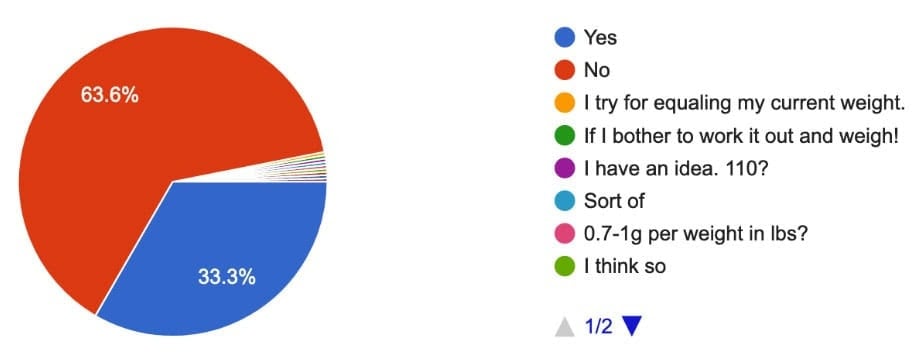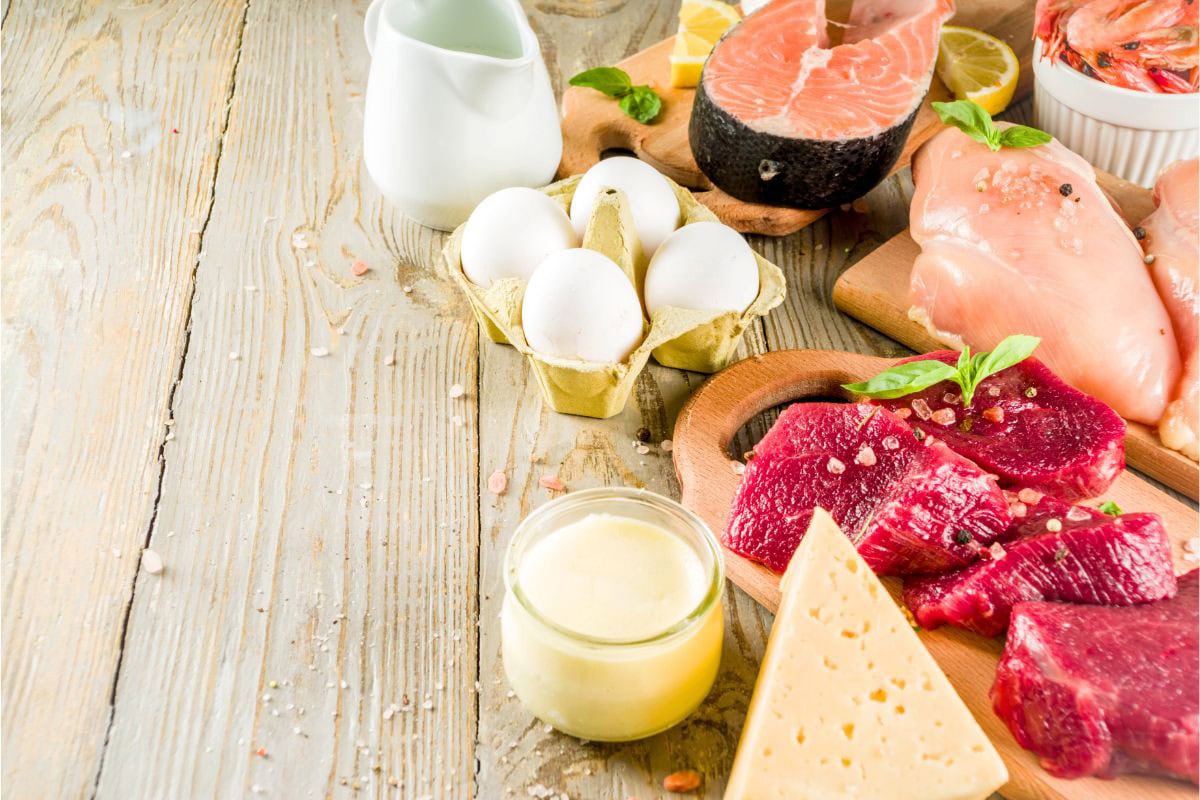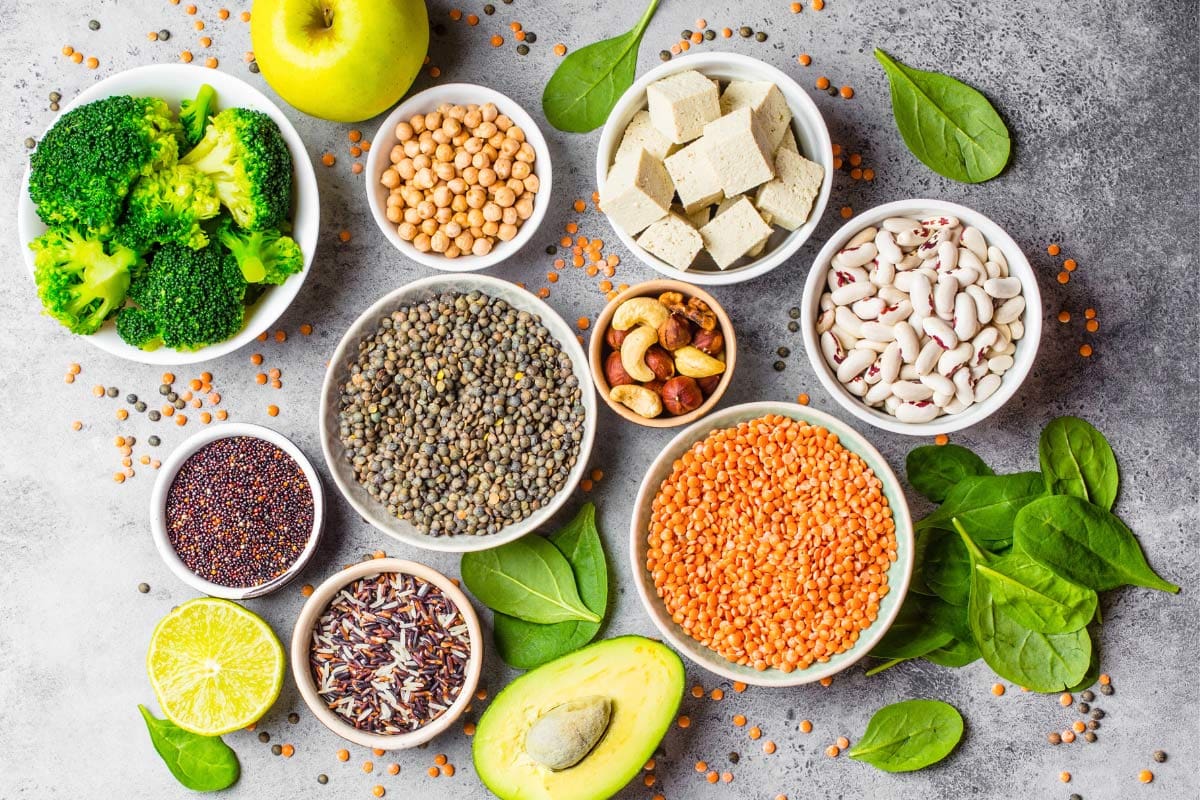How Much Protein Per Day Do Women Need?
HurryTheFoodUp is reader-powered. If you click through using links on our site we may earn a small commission at no cost to you.
I recently did a poll of our readers and discovered, to my surprise, that very few people knew how much protein per day they should be getting!


A lot of the participants in the poll were women, so I thought it was about time I gave a run down of how many grams of protein per day for women is necessary and healthy.
I’ll also explain where you can get that protein from and how much protein per day for weight loss.
Let’s get into it.
What is protein?
Protein is an essential macronutrient, made of amino acids which contribute to the healthy growth and repair of cells, the enzymes that carry oxygen through your blood… and a host of other super important functions.
There are 20 amino acids which create protein as we know it.
9 of those are termed “essential amino acids”, which means that your body cannot produce them itself.
Animal based foods contain all essential amino acids. This includes dairy and eggs.
Plant-based foods will not always contain all the essential amino acids, but this shouldn’t be a problem if you eat a varied, balanced diet and also include foods like dairy and eggs.
Protein intake for women


Protein intake for women is not fundamentally different from protein intake for men.
Your protein intake is determined (primarily) by your weight, and more specifically your muscle mass. Men tend to require more protein because they tend to have more muscle mass than women.
However, the minimum amount per kg of bodyweight does not change according to sex.
Recommended amounts of protein for women
There are two key factors that determine how much protein per day for females. The first is the basic measure of how many g per kilogram of bodyweight. You then have the changing factor of how active you are.
I’ll explain both these factors so you can find the ideal amount of protein for you.
Dietary reference intakes for protein
First up, we need to look at the bare minimum someone needs to stop protein deficiency. This applies to both sexes.
That number is accepted as 0.8g per kilogram of bodyweight (or 0.36g per pound).
We’ll use a bodyweight of 60kg as the weight of an average woman when any excess fat is discounted. Excess fat does not require extra protein and as such is not included in the calculations.
So 60 x 0.8 = 48.
That’s an absolute minimum of 48g protein to stop protein deficiency and stop any negative effects from a lack of protein.
Activity level and protein requirements
The more active you are, the more protein you will require as your muscles will be working harder and need to be repaired more frequently.


When it comes to how much protein per day when working out, the research suggests that active people should eat 1.4 – 2 grams of protein per kg body weight per day.
It’s useful to eat a good portion of protein in the hours after you finish exercising to help your body recover.
This is normally around 20g of protein for the average woman, but if you want to be more precise, a minimum of 0.35g of protein per kg of body weight in each meal.
Once you get your protein intake in the right range, it should become easier to build and then maintain muscle strength – which is perfect for an active lifestyle!
Our high protein meal plans go up to 85g of protein a day.
How much protein is too much for a women
You can go extremely high with protein without it having an adverse effect.
The main risk of too much protein intake is eating protein at the expense of other macros.
You can only eat so much in a day and if you are piling on the protein, there’s a chance you won’t be getting all the fibre, carbs, vitamins and minerals that you need.
So by all means up your protein intake, but don’t sacrifice a balanced diet!
The upper limit of our suggestions (2.0g of protein per kg of body weight) is perfectly safe, and within recommended limits of current research.
It even seems to be safe up to about 3.0g of protein per kg of body weight, but there’s no benefit in that so we don’t suggest it!
The bottom line is that unless you have a specific reason or diagnosis to limit your protein intake, such as Chronic Kidney Disease, a higher protein diet is safe and healthy.
Sources of dietary protein
There are many sources of dietary protein, but not all protein is created equal!
There are high quality proteins and low quality proteins, as well as protein sources that are unhealthy for other reasons eg. high concentration of saturated fats.
Many sources of protein are animal based and therefore not appropriate for vegetarians. However, it is an outdated nutritional myth that you can’t get enough protein as a vegetarian.
There are plenty of protein sources that aren’t just meat and fish. I’m going to talk you through all the main protein sources from meat to plants.
Animal based proteins


Animal based proteins are meat and fish. These are some of the richest sources of proteins however they are not always the healthiest.
Red meats and processed meats are high in saturated fats and there is a proven link between high red meat consumption and risk of heart disease and high cholesterol.
Stick to lean, white meat such as chicken. This has high quality protein and is a lot healthier than red meat.
Fish is also a great source of protein. Most commonly eaten fish, such as tuna, cod, salmon etc, contain plenty of protein and very little fat.
Fish also contains plenty of omega 3 fatty acids which are great for heart health, general brain function and even mental health!
Animal product proteins
Animal product proteins are different to animal based proteins. These are from what animals produce (ie. milk, eggs and all their derivatives), as opposed to the animals themselves.
Most animal products are vegetarian friendly (though it depends if you are a lacto, ovo, or lacto-ovo vegetarian)
Milk, eggs, cheese and yogurt are all good sources!
Eggs are particularly great for vegetarians as they are super versatile and can form the base of many different meals.
Try them in recipes as varied as the cream cheese scrambled eggs, this vegetable frittata and this baked eggs recipe.
Cheese can also be an effective way to incorporate more protein into your meal. Be careful with the saturated fat levels in cheese – it can be quite high.
I often recommend choosing the reduced fat option where possible (eg. low fat feta, low fat cream cheese).
Yogurt is a fantastic option for upping your protein intake at breakfast. Low fat greek yogurt with muesli, stirred into porridge or served with a raspberry compote…delicious!
We have a list of high-protein vegetarian foods here.
Plant-based proteins
Plant-based proteins are suitable for any diet, from vegans to meat eaters.


These are some of the healthiest protein sources in terms of being low fat, high fibre and full of other nutrients.
However, few plant based proteins contain all the essential amino acids. As I mentioned earlier, this isn’t an issue if you have a varied and balanced diet.
If you solely eat plant based protein sources and avoid all animal sources, you will need to be more careful and thorough with your diet to ensure you cover the essential amino acids.
Additionally, you can only get Vitamin B12 through animal-based food, which means if you avoid them you will need to take a supplement.
Plant-based proteins are primarily legumes, such as beans, lentils and chickpeas. There are also processed plant-based proteins such as tofu and tempeh, which are made of fermented soybeans.
Nuts are also a good protein source from plants. However, these are very calorie and fat dense, so be careful how much you eat. They are great for sprinkling on top of dishes to add an extra kick of protein!
You can also get plant-based yogurts and milks, usually legume or nut based, such as soy yogurt and almond milk.
Why not try our black bean and corn salad or this delicious vegan quinoa porridge?
Does protein help you lose weight?
Protein is super important for weight loss. First of all, you want your body to be functioning at full capacity when you try to lose weight, so you should be eating a balanced diet, of which protein is a fundamental element.
However, protein specifically has two interesting effects, which I’m particularly interested in when it comes to weight loss and protein.
- The more protein you eat, the more full you feel (the satiety effect). That means you’re less likely to eat more other food throughout the day.
- The more protein you eat, the better the ratio of body fat you lose compared to body muscle.
And, wonderfully, in turn – the more muscle you can keep, the more calories you will burn in your regular day to day activities.
This is because muscle burns more calories than fat!
It’s an amazing feedback loop.
Why lose weight?
Most of us have been motivated to lose weight at one point or another in our lives, for various reasons.
The most compelling one, especially as you get older, is health. There is a wide range of healthy weights for every body type, but once you tip over into the ‘overweight’ category, there can be ramifications further down the line.
Being seriously overweight for a long period of time increases the risk of developing diabetes, cancers of various types, heart problems and more.
Here at Hurry The Food Up, we focus on healthy, moderate weight loss, helping people to adopt healthier eating habits at the same time as they lose weight.


Check out our FREE 7 Day vegetarian for weight loss meal plan to find out more.
How much weight should I lose?
If you’re overweight, I would recommend aiming to lose 5-10% of your current body weight as a great goal to start with.
You can check your current BMI and weight using a BMI calculator – if it is within the healthy weight range then you may not need to lose weight in the first place!
The 5% and 10% goals have been studied and the evidence shows that when we lose this amount of our body weight there are significant changes.
Your blood pressure reduces, your cholesterol improves and your blood sugar levels will be better – to name but a few improvements.
Plus you will feel fantastic! Losing 10% of your weight is an incredible achievement.
I recommend losing 1-2 lbs (0.5kg-1kg) a week for healthy, safe weight loss. So, if 20lbs is your goal, set a minimum of ten weeks to achieve this.
How much protein is needed for weight loss
When it comes to how much protein for weight loss is optimum, you need to be eating at least the bare minimum to avoid protein deficiency.
Anything on top of that is an added bonus that will enhance your weight loss. I would aim between 1.4-2.0g per kilogram of body weight.
There are limits to how much protein you can consume while maintaining a balanced diet and staying within a calorie deficit.
It requires some careful planning to do this. Our carefully weight loss meal plans manage to provide you with 85g protein per day and all the other macros and nutrients you need, at just 1500 kcal per day.
That’s everything you need to know about how much protein per day for a woman is vital! From a standard healthy diet, to supporting your athletic pursuits to assisting with weight losing protein is one macro you can’t miss out on!



